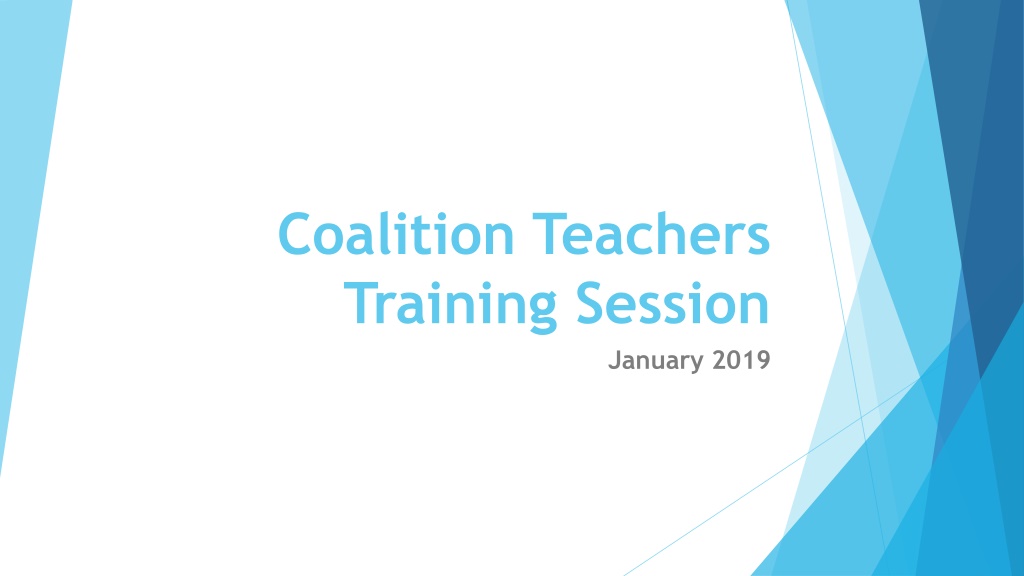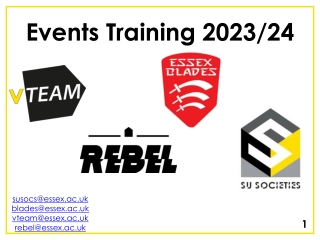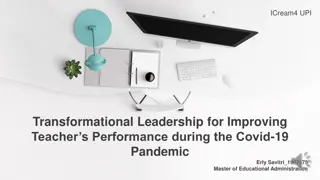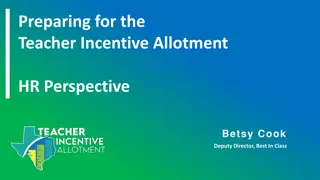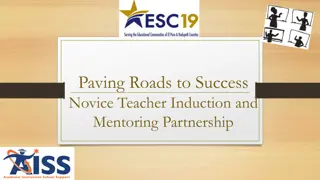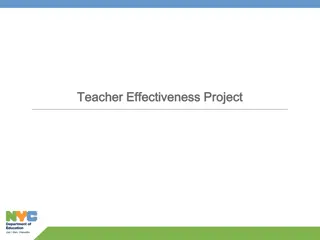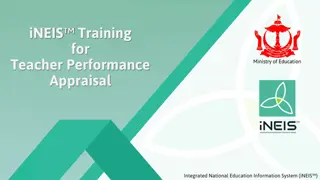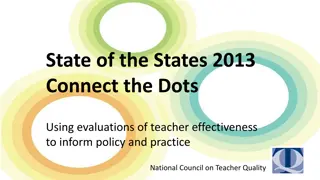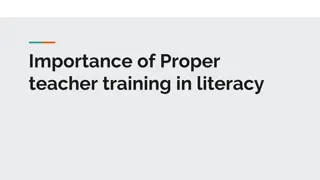Effective Strategies for Teacher Training Session
This content provides insights into a coalition teachers' training session held in January 2019. It covers various topics such as preparing for class, running the class, maintaining a respectful classroom, and handling undesirable behavior. The session also includes details on maintaining the space, class materials, elements of a successful teacher, and the importance of confidence and preparation. Practical tips and guides are shared to help teachers enhance their teaching skills and create a conducive learning environment.
Download Presentation

Please find below an Image/Link to download the presentation.
The content on the website is provided AS IS for your information and personal use only. It may not be sold, licensed, or shared on other websites without obtaining consent from the author. Download presentation by click this link. If you encounter any issues during the download, it is possible that the publisher has removed the file from their server.
E N D
Presentation Transcript
Coalition Teachers Training Session January 2019
Todays Agenda Why Are We Here? Ins and outs Preparing for class Running class Establishing and maintaining a respectful classroom Handling undesirable behavior
Ins And Outs Expectations for Maintaining the Space Keys implementing sign-in sheet Setting up the space door code, alarm, lights, front door, check your space, humidifier, whiteboard Downstairs HVAC use HVAC key in greenroom, adjust in room next to prop room Closing up the space checklist for checking out: Keep hall light on and curtain and greenroom door open Turn off AC/Heat Back Bathroom ensure lights and fan off; door locked Downstairs light off and door closed Front door locked Space cleared of trash and belongings Binders return them PROMPTLY at the end of class Ins and Outs
Class Materials What s In Your Binder? Guide To The Guide one pager reminder of how to use the binder Class Goals what students need to walk away from your class understanding Class Curriculum suggested flow, instructions and exercises for helping students build muscle memory to achieve class goals Teachers Best Practices bulleted guide for planning, giving notes and handling undesirable behaviors Preparing for Class
Elements of a Successful Teacher What You Need To Bring To Class Confidence Preparation Flexibility Preparing for Class
Confidence Be Confident YOU NEED TO BE: Your students need to implicitly and immediately trust that you know what you re doing or they re going to get distracted worrying about whether or not you do. It s significantly harder (although not impossible) to win them back after a false start than to establish yourself as a trustworthy guide from the start. YOU SHOULD BE: We have confidence that you know what you re doing. Trust that you re trusted and believe in that. Preparing for Class
Preparation Enables Confidence Students Need YOU To Teach Them You re fighting an uphill battle trying to convince anyone of anything in someone else s voice. The expectation IS NOT that you deliver to students exactly what is in the binder in exactly the order it is in the binder. To that end: the curriculum provided is a guideline that should be used to create YOUR OWN lesson plans for each class. Preparing for Class
Lesson Planning Best Practices What Your Lesson Plans Should Include Objectives - What will students learn/understand/do by the end of the class? Tell them! Write it on the whiteboard. If students know what the end goal is, they re more likely to connect activities to the stated goal on their own. Action/Practice - These should connect the stated objective to actions taken by students. EX - Rather than talking at students about how to do the objective, give them an activity that shows them how through experience. As they re working, you can reinforce or highlight examples of success with the objective through notes and feedback. Debrief/Review/Discussion - Ask students to articulate what they learned/noticed. This is also an opportunity for you to offer some walk-away key points. PRO TIP - Think through (and maybe write down) a few discussion questions that make sense for whatever your lesson topic is ahead of time so you aren t trying to come up with your end of this conversation on the spot. That leaves your brain much more free to respond to what your students are saying in the moment instead of focusing on what YOU need to say. Preparing for Class
Teach, Dont Lecture Getting Students To Do It Is More Important Than Why The Theory is in the curriculum to ensure all teachers are coming from the same place. It is less important that students know our theory than that they develop muscle memory through execution of the moves aligned with the theory. Students need to experience how a move contributes to a strong scene to really understand the value of the lesson. You can use the discussion/review after the activity to insert as much (or little) of the theory as you think will be helpful to your specific students. Think through what you re going to say to give students instructions, transition between activities, review or ask students to explain what they got out of an activity. You may THINK you know how to explain a short form game, but practice ahead of time to be sure. Students seeking clarity? Assure them that clarity comes from feeling through not taking through the exercise. Save talking/debating theory for hanging out after class. BOTTOM LINE: You should be talking way less than your students. If you're working harder than they are, you're doing it wrong. Preparing for Class
Instructions For Instructions Setting Up Exercises For Success Example flow for instruction: o Today we re going to focus on [skill]. - OBJECTIVE o These are the actions you'll take." - ACTION o Have them do the exercise. o See how [this] leads to [that]? - REVIEW o Noticed how these moves fostered [X] and these moves led us to dealing with [Y]? Give students an exercise through which to practice an action and the purpose of the action will prove itself. You don t have to make your case for why it works before it works. You should have that answer ready, but save it for when they have their own examples under their belts. The value of the lesson should be evident in what they've experienced. Preparing for Class
Objectively Teaching The Subjective Have A Page And Keep Everyone On It Keep focused on your Objective. You are going to see moves/behaviors outside of the Objective(s) of a class that you'll want to address. Unless A) the behavior is truly inappropriate or B) the fix is super quick, don't burden students by trying to address moves/behaviors outside the Objective. Focus notes from a run on a few actionable ideas / Don t walk through scene-by-scene Taking notes on a long form can be overwhelming because you have to capture all the moments in the moment, then roll up your observations into some themes and ultimately deliver some actionable direction they can use NEXT time. If you need time to compose your thoughts, start with them and/or take a bathroom break. Running Class
Coaching Consistently In Giving Feedback, Consistency Is Key Focus on actions/outcomes rather than "funny"/"not funny." You can't tell one player a move was "good" and another that the same move was "bad." You point out how an action given its circumstances led to a particular outcome and how perhaps a different move could have led to a preferable outcome given the circumstances. If you're consistent, you don't have to worry about hurting feelings because you're being objective. Again, focused on actions/outcomes, rather than allowing a choice to define an individual, we can sidestep hurt feelings entirely - it's not about YOU, it's about the move and the circumstances. When a teacher assumes there will hurt feelings, there will be. You can hear a teacher "trying not to make something seem personal," and all the student hears is "this is personal." YOUR voice becomes the consistency for the GROUP. An individual may disagree, but for the sake of being in the class, and in the spirit of learning, students need to try to unite behind your instruction. Meaning, your instruction needs to be concrete and consistent so as to unite behind. Newman has a great quote about accepting direction - "...it's okay to disregard later, but try it now." Running Class
Directing Action Know what you want to see and how to direct the action to get there Notes need to be: a. Actionable - Do this. b. Applicable to future scenes - if you re a penguin talking to a nun say this... isn t useful. Students need notes that will help lead to better outcomes in all scenes. Stay positive. There are no mistakes in improv (except those we tell the audience we ve made). Accept students' choices, but show them how a different choice may have led to a more preferred outcome. Avoid telling students "you're not getting it; go back." All they'll focus on at that point is having been wrong. And remember, sometimes you'll have to move on before all students totally "get it." It takes time for these ideas to sink in - and it takes stage experience for students to go from "get it" to "do it." Running Class
Flexibility You Have To Follow Students In THEIR Moment Another reason not to waste too much time with the "why" before students engage in activities? Exercises may not go as planned! Whether the activity goes as you planned or not, having your students articulate to you the value of what they did is ALWAYS a good thing. Maybe you thought it was a disaster but they saw something valuable or saw a connection you didn t. Let them do the work! PRO TIP - After an exercise, ask THEM for THEIR observations before providing yours. This is the best way to check in on their understanding and gauge whether you can move on. From there you can guide the conversation to whatever take- aways you think are most relevant. The Curriculum is a map, but your class terrain might shift. Your students might breeze through some exercises and get stuck on others. Because of understanding or absences, they might need an extra class to address certain material. Every class is different. Let your plan adjust to what they need. Running Class
Setting Expectations, Establishing Norms Your First Class Checklist Get Student IDs from desk in booth and disseminate Give out the Class Handouts and point out the reference materials Confirm classes email addresses you will start class thread You are encouraged to send a summary email after each class with links to reference material (see Homework section of each class session in curriculum) Note that students should come to class physically prepared to participate they ll want to wear clothing that will enable them to do whatever anyone else does on stage. Set expectations for attendance and starting/ending on time Students are allowed only two absences before they have to drop the class Encourage students to SEE SHOWS and hangout outside of class to know each other better You don t have to hang out after every class but certainly aim to lead by example after the first class Handout Harassment & Discrimination policy form / Talk about class norms and respect Norms and Expectations
Establishing A Safe Space Fostering a respectful atmosphere where we can discuss our comfort Acknowledge that improv theaters across the country have struggled with harassment, discrimination and power imbalance issues, and The Coalition wants to provide resources to ensure it remains a place where all feel respected and heard Kim Nario will be sending an email to you all as another channel for discussing experiences Calling In, Not Calling Out - We want students to feel empowered to discuss as a team what is and isn t comfortable subject matter any subject matter. As the instructor you will model the behavior of asking was that okay? not with the intention of making someone feel bad, but rather so we can all learn from each other perspectives Yes, And does NOT necessitate to agreeing to being uncomfortable While we practice saying Yes in 101 because our default is so often No, students need to hear that improv s Yes is about accepting the reality on stage, and if in your reality on stage you cannot agree to what s been said, you NEVER have to feel like you HAVE TO. Reacting as YOU would to the reality presented honors the important Accept behind the Yes And leaving the stage when you re uncomfortable is always an option We need each other to improvise. We become better improvisers (and people) when we commit to sharing ourselves and understanding each other. Norms and Expectations
Maintaining A Safe Space Developing class norms should be a continual process Be overly sensitive - It is your job to foster inclusion and speak to the concerns that might not be voiced for example, even if no one complains about subject matter coming up in a scene, err on the side of addressing it. Use I Statements I noticed If I was in that scene, I can see that affecting someone negatively, Take on the perspective of the audience I think the audience might react to that But don t let audience perspective inspire the easy joke we should strive to do better If players are putting their fellow improvisers into compromising positions on stage: Remind them improv is more about being affected than trying to affect others. Good improv accepts. We shouldn t be dictating demands on our players actions. If you think your idea is a funny position for a character to be in, PUT YOURSELF in that position, don t force it on a fellow player. Don t rub the offender s face it in; move on. Let s just all avoid commenting on each other s clothing. Cool? Let s get two more people up. Norms and Expectations
Classroom Management Dealing with inappropriate behavior Address it, Don't spread it - While you are encouraged to talk to Coalition leadership, and you can talk to those students DIRECTLY engaged in the event, DON'T talk about the situation with 3rd party individuals. Don t. Seek a Conversation - To be productive, it can't be one-sided. Prioritize Face-to-Face: When possible, try to do it face to face after class. Send an email asking for a time to talk. Explain "why" in the email - "I m hoping we can talk [not talk to you] about some moves you made in class so we can ensure the ensemble is all aligned moving forward. Don't waste time coordinating schedules. Get on the phone if need be. Email should never be the first move. Handling Undesirable Behaviors
Having The Conversation Sample Flow of Conversation Problem Statement: I witnessed X and it led to Y. Don't assume bad intentions. Be in it together. Listen/HEAR: Ask them about their feelings. Seek to understand. Acknowledge their perspective, but stand firm: At the end of the day, you are the authority: "I understand. My responsibility, though, is for the class and I can't have these behaviors lead to these outcomes." Next Steps: If the behavior continues, this will be the result. But we move forward from here all together, no problem. Thank you: Thank you for being open to this conversation. I really appreciate it. Handling Undesirable Behaviors
Becoming A Gold Star Teacher What Distinguishes Our Best Teachers Spend a lot of time preparing each class, putting the focus on getting students building muscle memory through doing and minimizing lecturing Send emails out after every class with a recap, reference materials/links and suggested shows to see Get comfortable discussing uncomfortable issues, committing to establishing and maintaining norms of respect that will enable students to work with each other, trust each other, and grow together Ask students for early feedback on the Teacher/session, checking in mid session to ask students if they re getting what they need and whether they have suggestions Provide some personal WRITTEN feedback to each student toward the end of the session with concrete actions they can pursue to improve Develop a personal note taking style that enables them to identify 2 to 3 actions that can help students in their next scenes, instead of agonizingly picking apart scenes moment-by-moment Cultivate a TEAM while all students need to learn the same material, help each individual succeed as part of the team (ex: share the stage / get out there )
Questions? Concerns? Clarifications? What Haven t We Covered? What else is on your teaching mind? Consider Patrick Gantz, Katie Holcomb and Katie McCall at your service. Call. Email. Patrick Gantz Patrickgantz@gmail.com (773) 744-5103 Katie Holcomb Holcomb@rvacomedy.com (804) 349-7479 Katie McCall Mccall.Katherine@gmail.com (847) 962-3193
